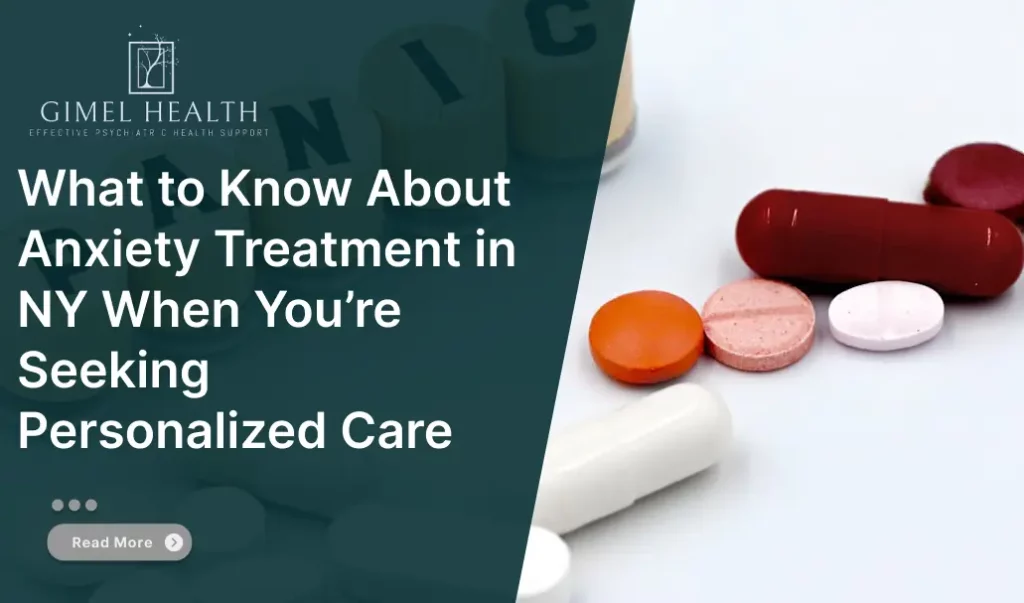
Anxiety is one of the most common mental...Read More

With close monitoring, I track anxiety symptoms, depression symptoms, panic attacks, obsessive compulsive disorder (OCD), and sleep problems to ensure your treatment remains safe and effective. If your response changes or side effects emerge, such as withdrawal symptoms, serotonin syndrome, or low blood pressure, I’ll adjust your treatment plan.
I work collaboratively with your healthcare provider and broader care team to manage potential drug interactions, monitor for urinary retention or sexual side effects, and support you through any challenges that may arise. My goal is to minimize risks, reduce adverse effects, and ensure you receive the best medication for your unique mental health condition, while helping you restore balance, function, and peace of mind in your daily life.
Whether you’re navigating treatment-resistant depression, postpartum depression, or living with a mood disorder like bipolar disorder or major depressive disorder, I’m committed to helping you find the best treatment, one that delivers results you can feel and maintain long-term.
I tailor a comprehensive medication for anxiety and depression NJ approach, leveraging evidence-based options, from SSRIs and SNRIs to atypical antidepressants and benzodiazepines, based on your specific mental health condition. By working closely with your healthcare provider, I select the best medication that balances efficacy with fewer side effects and supports your daily life. This may also include evaluating different types of antidepressants for conditions like panic disorder, major depressive disorder, or obsessive compulsive disorder.
I develop a custom treatment plan that may include Cognitive Behavioral Therapy, talk therapy, or clinical trials alongside medication like Wellbutrin SR or Effexor XR. Regular check-ups assess weight gain, dry mouth, or sexual dysfunction, and I recommend additional health services as needed; like counseling, support groups, or lifestyle changes.
Each plan considers potential drug interactions, especially when treating related disorders such as bipolar disorder or post-traumatic stress disorder.
One of the most nicest, kindest and considerate doctors I met.
He went over with me thoroughly on the documents and was generous enough to explain me everything that I asked.
I think he is a real doctor of people and not just someone that’s write prescriptions.
I wanted to sincerely thank Dr Feldman for his help during my time in the U.S.
His support, especially when my country was under attack, flights were grounded and medication was hard to access, made a real difference.
He was very kind, professional, and helped me get exactly what I needed in the best and most thoughtful way.
Michael Feldman is an exceptional mental health provider who truly listens and takes time to understand patients’ concerns. He provides thoughtful guidance and support.
I met Michael Feldman after years of search and trial and error. If you look for a professional who is invested in his patient’s progress, research-oriented, with a deep understanding of the body-mind connection and a wholistic approach to treatment, look no further.
Dr Michael Feldman is an amazing doctor. He prescribed the proper medication in the right dosage for me. He did this because he listens and asks very good questions. I highly recommend him and his practice at Gimle Health.
Michael Feldman is a wonderful and caring P.A. He always gives 100%. He listens attentively and provides many insights I would never thought of by myself . I find having him in my corner invaluable and I could not recommend him more highly. He’s the best!
Michael is an amazing professional! He truly invests in his patients and provides care and feedback even during off hours. Although we have only been using his services for a short time, he already stands out as caring, knowledgeable, and confident in his approach. We plan to continue using his services and would absolutely recommend him to anyone!
Your journey to better mental health starts here. With advanced expertise in biology and psychiatry, I build exclusive medication plans backed by science. Contact me to schedule your initial consultation.
(201) 815-4351
440 West Str, Ste 307, Fort Lee Bergen County NJ 07024
Anxiety is one of the most common mental...Read More
Finding the right psychiatrist NJ is one of...Read More
Anger is a normal emotion, but when it...Read More
Premenstrual Dysphoric Disorder is a severe form of...Read More
Many mental health providers see patients who show...Read More
Medication management is one of the most effective...Read More
Yes, many antidepressant medications—especially SSRIs and SNRIs like venlafaxine or duloxetine—are FDA-approved for treating both major depressive disorder and anxiety disorders such as panic disorder and social anxiety disorder. These medications help regulate serotonin and norepinephrine levels in the brain, reducing both anxiety symptoms and depression symptoms simultaneously. In cases where there are physical symptoms like chronic pain or sleep problems, or if you’re experiencing treatment-resistant depression, I may explore atypical antidepressants, different types of antidepressants, or a tailored treatment plan that may include cognitive behavioral therapy or lifestyle changes. By assessing your full medical history and mental health condition, I ensure the medication chosen aligns with your daily life and long-term wellness goals.
Side effects such as dry mouth, weight gain, sexual dysfunction, or low blood pressure are common with many types of antidepressants. I monitor these closely during our regular check-ins and may switch you to medications like bupropion or atypical antidepressants, which are associated with fewer side effects for many people. Depending on your response, I may also adjust the dose, timing, or even explore different medication classes such as tricyclic antidepressants or norepinephrine reuptake inhibitors. We’ll work together to manage any adverse effects while still treating your anxiety symptoms or symptoms of depression effectively. If needed, I coordinate with your healthcare provider to ensure safe use, especially when managing complex cases like treatment-resistant depression or comorbid mental health conditions.
Most SSRIs and SNRIs take about 4–6 weeks to reach full therapeutic effect, though some patients begin noticing improvements in sleep problems, anxiety symptoms, or energy levels within the first 1–2 weeks. Faster-acting medications like mirtazapine may also improve appetite or help address insomnia early in treatment. For conditions like major depressive disorder or panic disorder, it’s important to continue medication for at least six months after you start feeling better to reduce relapse risk. Throughout your treatment plan, I’ll monitor for withdrawal symptoms, serotonin syndrome, and any changes in mental health conditions to ensure your medication for anxiety and depression NJ remains both effective and well-tolerated.
Absolutely. Evidence supports combining talk therapy, lifestyle changes, and supervised herbal supplements to enhance outcomes in treating major depressive disorder and anxiety symptoms. I carefully evaluate your full treatment plan to ensure these additions don’t interact with prescribed medications or increase the risk of side effects like low blood pressure, serotonin syndrome, or dry mouth. Incorporating regular physical activity, consistent sleep routines, and social support into your daily life can significantly improve the effectiveness of both antidepressants and anxiety medications. Together, we focus on safe use and a comprehensive recovery approach.
Yes, many types of antidepressants and anxiety medications are safe and effective for both young adults and older individuals. However, I pay close attention to age-related risk factors and make dose adjustments when needed to prevent complications like urinary retention, low blood pressure, or sexual dysfunction. For young adults, I also consider concerns around the risk of suicide or treatment-resistant depression and monitor carefully for serious side effects during the early stages. Your mental health treatment is always tailored to your unique health profile, ensuring both safety and optimal outcomes.
Yes, there are several drug classes used to treat depression and anxiety disorders. These include SSRIs (Selective serotonin reuptake inhibitors), SNRIs (serotonin-norepinephrine reuptake inhibitors), Tricyclic antidepressants, Monoamine oxidase inhibitors (MAOIs), and Atypical antidepressants. I determine the best medication for your needs by reviewing your symptoms of depression, medical history, potential for drug interactions, and any coexisting mental health conditions like bipolar disorder, obsessive compulsive disorder, or panic disorder. Choosing the right treatment also involves considering the likelihood of adverse effects like dry mouth, weight gain, or withdrawal symptoms.
Definitely. Many anxiety medications not only help relieve emotional distress but also address physical symptoms like panic attacks, muscle tension, gastrointestinal issues, and sleep problems. Medications such as benzodiazepines and certain SNRIs are particularly effective for treating both the mental and physical aspects of conditions like panic disorder, post-traumatic stress disorder, and social phobia. I take into account both your psychological and physical symptoms, ensuring that your treatment of depression and anxiety is holistic and personalized.
While depression medications are generally well tolerated, some individuals may experience serious side effects like suicidal thoughts, serotonin syndrome, sexual dysfunction, or even adverse effects on blood pressure. These risks are often associated with higher doses, drug interactions, or when combining different medications or supplements. I monitor you closely during treatment—especially if you’re taking additional medications or herbal supplements—and may adjust your prescription to prevent complications. This ensures safe use and maximizes the benefits of your mental health treatment while minimizing risks.
Yes. Conditions like premenstrual dysphoric disorder (PMDD) and postpartum depression often benefit from targeted treatments, such as SSRIs, Atypical antidepressants, and occasionally atypical antipsychotics. In these cases, I consider hormonal patterns, related disorders, and your daily life needs to design a treatment plan that supports your emotional and physical well-being. Your mental health condition is approached with sensitivity to hormonal fluctuations and a deep understanding of gender-specific mood disorders, ensuring the best option for long-term relief.
The National Institute of Mental Health (NIMH) plays a key role in funding clinical trials, systematic reviews, and research aimed at improving the safety, efficacy, and long-term outcomes of medications used for mental disorders. Up-to-date findings from nimh.nih.gov and the American Psychiatric Association guide my practice, adjust treatment strategies, and apply the latest evidence-based protocols in your care. Their data helps identify new antidepressant options, better management for serious side effects, and supports the development of more personalized mental health treatment plans.
We use cookies to improve your experience on our site. By using our site, you consent to cookies.
Manage your cookie preferences below:
Essential cookies enable basic functions and are necessary for the proper function of the website.
These cookies are needed for adding comments on this website.
Google reCAPTCHA helps protect websites from spam and abuse by verifying user interactions through challenges.
Google Tag Manager simplifies the management of marketing tags on your website without code changes.
Statistics cookies collect information anonymously. This information helps us understand how visitors use our website.
Vimeo is a video hosting platform for high-quality content, ideal for creators and businesses to showcase their work.
Service URL: vimeo.com (opens in a new window)
You can find more information in our Cookie Policy and Privacy Policy.